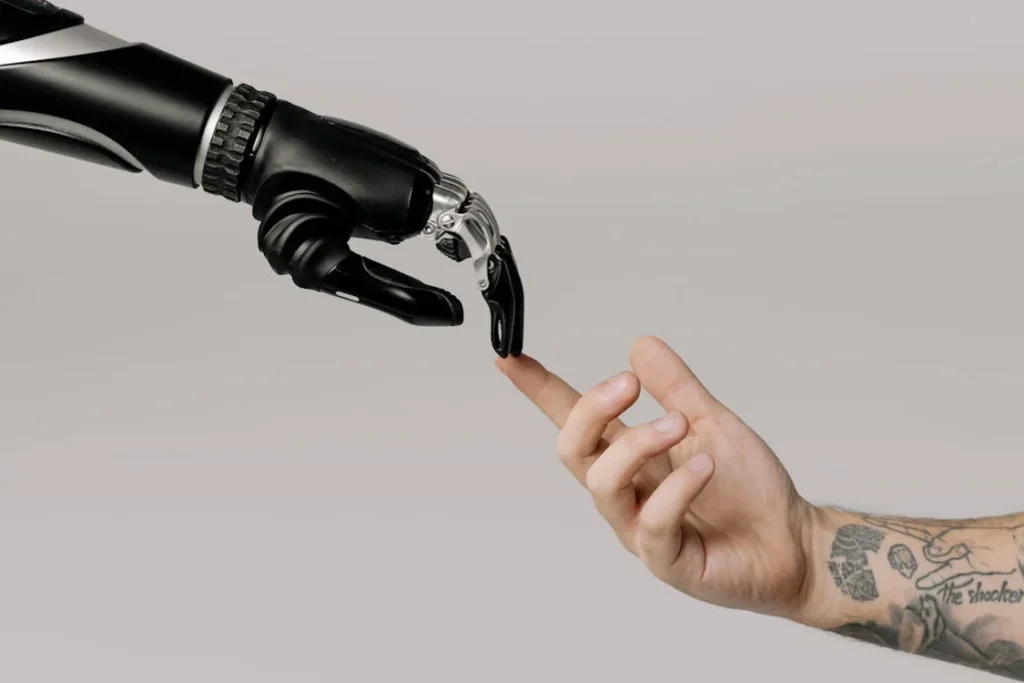Losing a limb changes life in ways most people never imagine. It’s not just about physical adjustments—it’s about learning to handle the emotional impact that comes with it. You might feel sadness, frustration, or even fear about what the future holds. That’s completely normal.
Coping after an amputation isn’t just about healing your body; it’s also about taking care of your mind. The journey can feel overwhelming at times, but you are not alone. With the right mindset, support, and strategies, you can regain confidence and independence. This guide will walk you through practical ways to handle the emotional side of amputation, helping you move forward one step at a time.
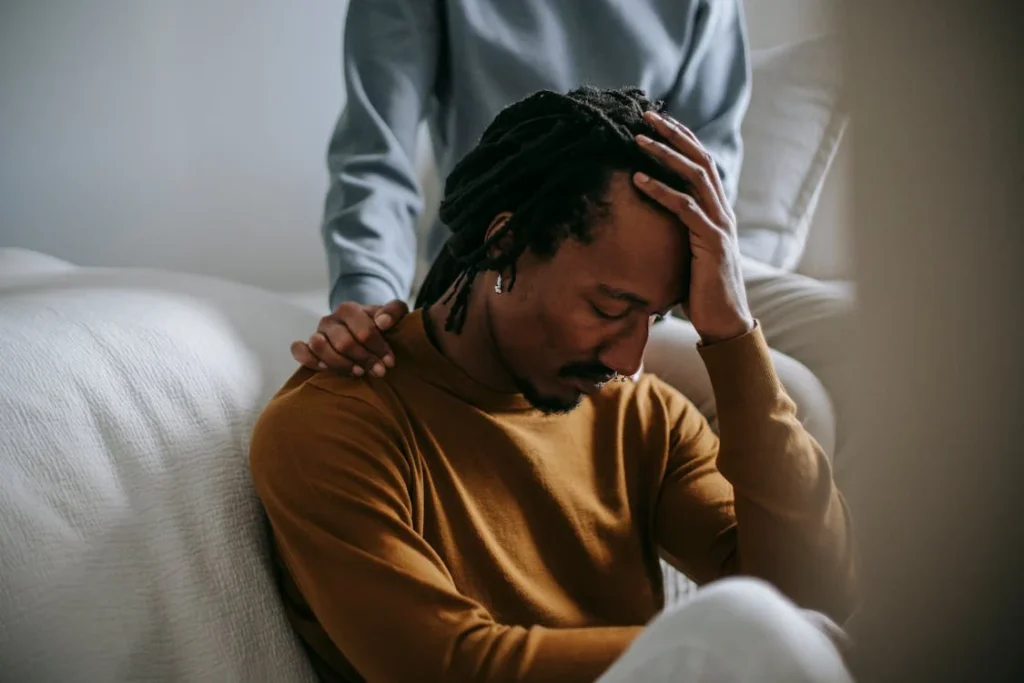
Understanding Your Emotions After Amputation
Going through an amputation is not just a physical change—it is an emotional journey as well. It is completely natural to experience a wave of emotions that may feel confusing or overwhelming.
Some days, you might feel hopeful about the future, while other days, you may feel a deep sense of loss. Understanding that these emotions are a normal part of the healing process can help you navigate them more effectively.
Grief and Loss Are Normal
After an amputation, it is common to feel a deep sense of grief. Losing a limb is a significant change, and just like losing anything important, grief follows.
You may go through different stages, including denial, anger, sadness, and eventually, acceptance. Some days, you might wonder why this happened to you or feel angry at the situation.
Other times, you may feel a sense of emptiness or frustration because things that once felt easy now require extra effort.
These feelings are normal. Grief is not a sign of weakness—it is a part of adjusting to life after amputation. Everyone processes loss differently, so there is no right or wrong way to feel.
Some people may come to terms with their new reality faster, while others need more time. The key is to allow yourself to feel these emotions rather than pushing them away. Suppressing feelings can make them more intense over time.
Fear of the Unknown
One of the biggest emotional challenges after an amputation is fear. You might worry about how life will look moving forward. Simple questions like, “Will I be able to work again?” or “How will people treat me?” can feel overwhelming.
Not knowing what to expect can create anxiety, making it difficult to focus on recovery.
The best way to handle fear is to take things one day at a time. Instead of focusing on everything at once, concentrate on small victories. Every step, no matter how small, is progress.
Talking to others who have gone through a similar experience can also help. When you see that others have adapted and built fulfilling lives after amputation, it reminds you that you can do the same.
Frustration and Adjusting to New Challenges
Daily tasks that were once second nature may now feel frustrating. Simple things like walking, writing, or even getting dressed might take extra time and effort.
This frustration is completely valid. However, over time, as you learn new ways to do things, these challenges will become easier to handle.
It is important to remind yourself that struggling does not mean failing. Every time you practice a new skill, you are training your body and mind to adapt. With patience and persistence, what feels difficult today will become second nature in the future.
Finding Hope and Strength
While the beginning of this journey may feel difficult, it is also the start of something new. Many people who go through amputation discover a strength they never knew they had.
Over time, new possibilities open up, and you learn to focus on what you can do rather than what you have lost.
Surrounding yourself with a strong support system can make a huge difference. Family, friends, and support groups can remind you that you are not alone.
Connecting with professionals, such as therapists or prosthetists, can also help you find practical solutions that make daily life easier.
Most importantly, be kind to yourself. Healing takes time, and it is okay to have good days and bad days. The important thing is to keep moving forward, one step at a time.

Building Emotional Resilience After Amputation
Learning to cope emotionally after an amputation requires resilience. Resilience does not mean ignoring your feelings or pretending everything is fine.
Instead, it is about finding ways to adapt, regain confidence, and rebuild your life. Emotional strength comes with time, but there are steps you can take to make this transition smoother.
Accepting Your New Reality
One of the hardest yet most important steps in emotional recovery is acceptance. Accepting your amputation does not mean you have to feel happy about it. It simply means recognizing that this is your new reality and finding ways to move forward.
The more you resist or deny what has happened, the harder it can be to adjust.
At first, you may feel like life will never be the same. And in many ways, that is true—things will be different. But “different” does not mean “bad.”
Many people who have gone through amputations eventually find new passions, new goals, and even a new appreciation for life. What feels impossible now will, over time, become your new normal.
One of the best ways to accept your situation is to focus on what you can control. You may not be able to change the past, but you can decide how you move forward.
Whether it is working with a therapist, joining a support group, or learning to use a prosthetic, taking small steps each day will help you regain control over your life.
Overcoming Self-Doubt and Negative Thoughts
It is common to experience negative thoughts after an amputation. You might feel like you are not the same person anymore, or you may worry that others see you differently. These thoughts can create self-doubt, making it harder to rebuild confidence.
When negative thoughts arise, remind yourself that they are just that—thoughts. They are not facts. Just because you feel limited now does not mean you will always feel this way.
Your body may have changed, but your value as a person has not. You are still capable, strong, and worthy of living a fulfilling life.
Instead of focusing on what you have lost, try shifting your mindset toward what is possible. If you catch yourself thinking, “I can’t do this,” reframe it as, “I am learning how to do this differently.”
The words you use when speaking to yourself matter. Encouraging yourself instead of criticizing yourself can make a huge difference in your emotional recovery.
Finding Strength in Support
Healing emotionally does not have to be a journey you take alone. Talking to people who understand what you are going through can make a huge difference.
Support groups, whether in person or online, offer a space to share your feelings, ask questions, and learn from others who have been in your shoes.
Family and friends also play a crucial role in emotional recovery. If you feel comfortable, let them know what kind of support you need. Some days, you might need someone to listen.
Other days, you might need encouragement to stay motivated. It is okay to ask for help—seeking support is a sign of strength, not weakness.
Professional counseling can also be beneficial. A therapist can help you process your emotions, work through fears, and develop coping strategies tailored to your needs.
If you ever feel stuck in negative thoughts or find it difficult to move forward, talking to a mental health professional can provide guidance and reassurance.
Setting New Goals for the Future
Having something to work toward can bring back a sense of purpose and motivation. Your goals do not have to be big—they just need to be meaningful to you.
Maybe you want to regain your independence in daily activities, learn how to use a prosthetic, or even take up a new hobby.
Setting goals gives you something positive to focus on. Every small achievement is a reminder that you are making progress. Celebrate these wins, no matter how small they may seem. Progress is not about how fast you move—it is about continuing to move forward.
Rebuilding your life after an amputation takes time, patience, and self-compassion. But with the right mindset and support, you can find new ways to thrive.
The emotional challenges may feel overwhelming now, but step by step, you will regain confidence and discover that life after amputation can still be meaningful and fulfilling.
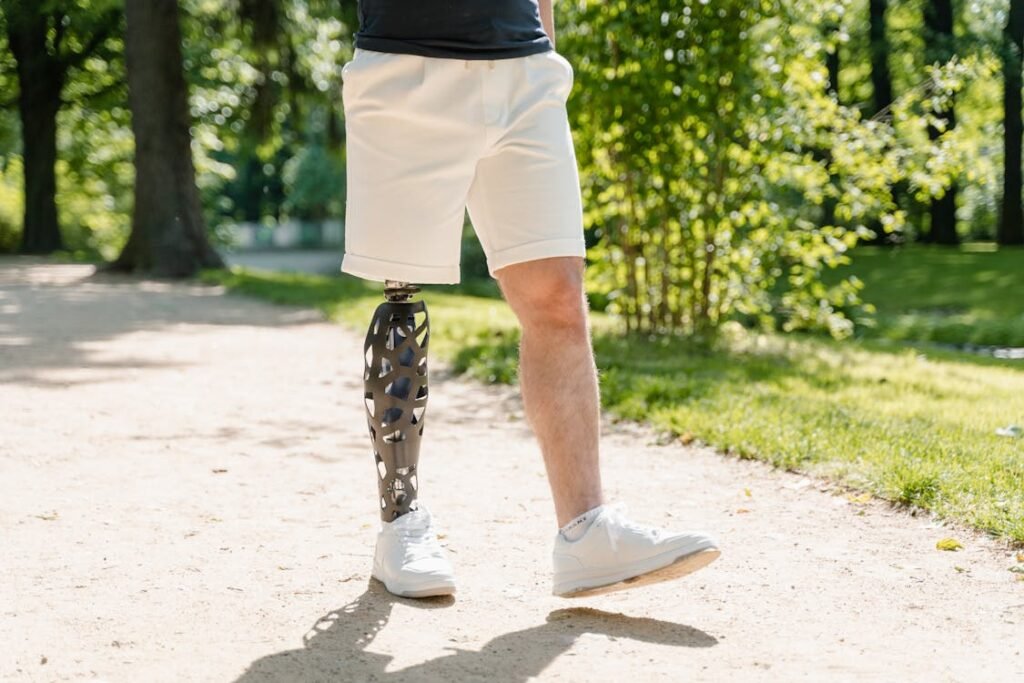
Adapting to Daily Life After Amputation
Once the initial emotional shock of an amputation begins to settle, the next challenge is adjusting to daily life. Simple tasks may feel unfamiliar at first, and frustration is a natural part of the process.
However, as you build new routines, you will start to regain a sense of control and confidence.
Regaining Independence
After an amputation, many people worry about losing their independence. The truth is, while some tasks may require new techniques or assistive devices, independence is absolutely achievable. It starts with patience and a willingness to learn new ways of doing things.
Physical therapy and rehabilitation play a crucial role in this process. These sessions are designed to help you strengthen your body, improve balance, and practice new ways of moving.
If you are using a prosthetic, therapy will also help you learn how to use it effectively. Over time, what feels difficult in the beginning will become second nature.
It is also important to allow yourself time to adapt. If a task feels overwhelming, break it down into smaller steps. Celebrate progress, no matter how small. Every step forward is a victory, even if it does not feel like it at the moment.
Coping with Changes in Mobility
If your amputation affects mobility, getting used to movement again can be challenging. Whether you are using crutches, a wheelchair, or a prosthetic limb, there is a learning curve involved. You might experience discomfort, fatigue, or even frustration in the early stages.
The key is to give yourself grace. Your body is adjusting, and that takes time. Work closely with your physical therapist to find the best mobility solutions for you. Strengthening exercises and rehabilitation techniques will help you move more comfortably and with greater confidence.
At home, small adjustments can make daily life easier. Rearranging furniture, installing handrails, or using assistive tools in the kitchen or bathroom can reduce strain and improve accessibility.
Over time, these changes will help create a space where you feel safe and independent.
Handling Social Situations and Self-Confidence
One of the biggest emotional hurdles after an amputation is navigating social interactions. You may feel self-conscious about how people will react to your limb loss. Some individuals worry about being treated differently, while others may not want to discuss their amputation at all.
It is completely up to you how much you share. If someone asks about your amputation and you do not feel like explaining, a simple response like, “I had surgery, but I’m doing well now,” is enough.
If you do want to talk about it, that is fine too. There is no right or wrong way to handle these conversations.
Building self-confidence takes time, and it helps to focus on what makes you feel good. Wearing clothes that make you comfortable, engaging in activities you enjoy, and spending time with supportive people can boost confidence.
Remember that you are still the same person, and your worth is not defined by your physical appearance.
Finding Joy and Purpose Again
At first, it may seem like life after amputation is all about adjustment and challenges. However, as you regain independence, it is important to also focus on what brings you joy. Hobbies, interests, and personal goals can bring a sense of purpose and fulfillment.
If certain activities feel difficult now, explore new ways to engage in them. Adaptive sports, art, music, and community activities can be fulfilling outlets. Many people find that trying new things helps them rediscover passions and build a positive outlook on the future.
A strong support network can also bring joy. Whether it is spending time with family, joining a support group, or meeting others who have had similar experiences, social connections can make a big difference in emotional well-being.
Adjusting to life after amputation is a journey that requires patience, strength, and resilience. The challenges may seem overwhelming at first, but with time, practice, and support, you will find your new normal.
Each day is a step forward, and every effort you make brings you closer to living a fulfilling life.
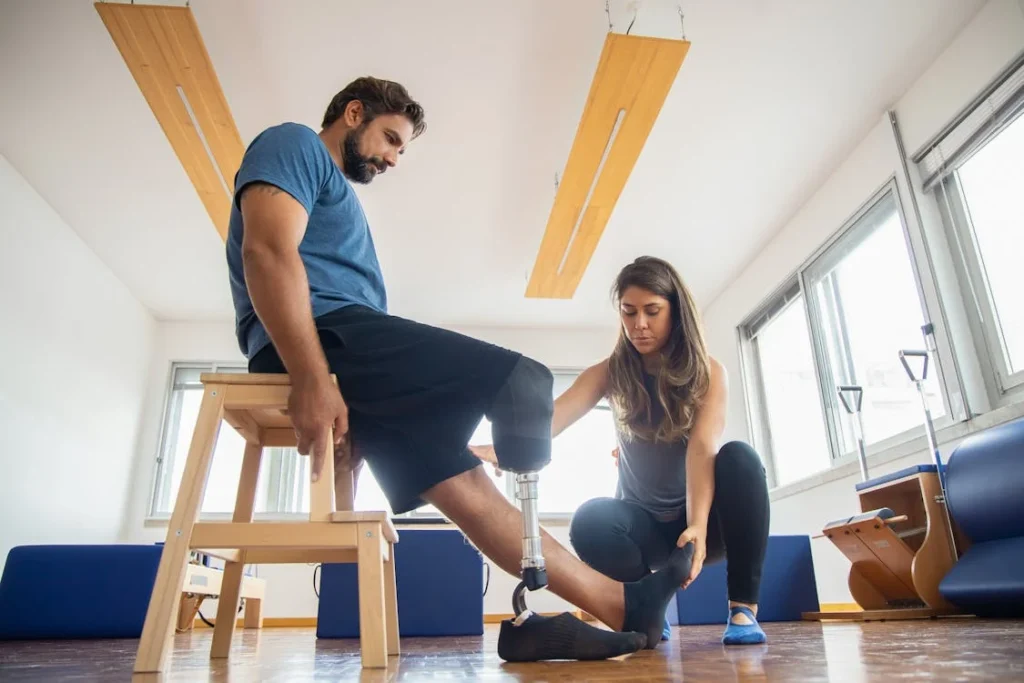
The Role of Rehabilitation in Emotional Healing
Physical recovery after an amputation is only part of the journey. Emotional healing is just as important, and rehabilitation plays a key role in helping you regain confidence and adapt to life again.
Rehabilitation is not just about movement—it is about rebuilding your sense of self, finding new strengths, and learning to embrace life after amputation.
Why Rehabilitation Matters
When you go through an amputation, your brain and body need time to adjust. Rehabilitation helps bridge that gap by training your muscles, improving coordination, and helping you become more comfortable with movement.
More importantly, it gives you the opportunity to regain independence and feel more in control of your body.
Many people assume rehabilitation is just for learning how to use a prosthetic, but it is much more than that. It also focuses on balance, strength, and stamina, so you can move with confidence.
Working with professionals, such as physical therapists and occupational therapists, ensures that you receive personalized training tailored to your specific needs.
Beyond the physical benefits, rehabilitation helps with emotional healing. It gives you small, measurable goals to work toward, which can boost your motivation and self-esteem.
Each milestone, whether it is standing up for the first time or mastering a new movement, serves as a reminder of how far you have come.
Gamified Home-Based Rehabilitation
One of the biggest challenges after an amputation is staying motivated to practice rehabilitation exercises. This is where gamified home-based rehabilitation can be a game-changer.
By turning exercises into interactive and engaging activities, it makes therapy more enjoyable and effective.
Gamified rehabilitation uses technology, such as virtual reality or interactive exercises, to help improve movement, coordination, and muscle strength. Instead of repetitive workouts, these programs turn rehabilitation into a fun and rewarding experience.
Many people find this approach helps them stay consistent with their therapy, leading to faster progress.
Robobionics offers gamified rehabilitation programs designed to help prosthetic users build confidence and adaptability in a fun, stress-free way. If you are interested in learning more, reach out to us today and explore how interactive rehabilitation can enhance your recovery.
Emotional Support During Rehabilitation
Rehabilitation is not just about training your body—it is also about strengthening your mind. Some days will feel easier than others, and it is important to be patient with yourself.
If you feel frustrated or discouraged, remind yourself that progress is not always a straight line. Some days you may struggle, but that does not mean you are not improving.
Having emotional support during rehabilitation makes a huge difference. Talking to others who have been through similar experiences can be incredibly motivating. Support groups, peer mentors, and even online communities can provide encouragement, advice, and reassurance.
If you ever feel stuck or overwhelmed, speaking to a professional counselor can help. Therapists trained in trauma recovery or disability adjustment can help you navigate emotional roadblocks and develop healthy coping strategies.
Staying Committed to Progress
One of the most important aspects of rehabilitation is consistency. The more you practice, the easier movement becomes. Even on days when motivation feels low, remind yourself why you started. Set small goals and celebrate your achievements along the way.
Recovery after an amputation is a journey, but with the right mindset, support, and rehabilitation strategies, you can regain strength and confidence. The road ahead may have challenges, but each step brings you closer to a fulfilling and independent life.
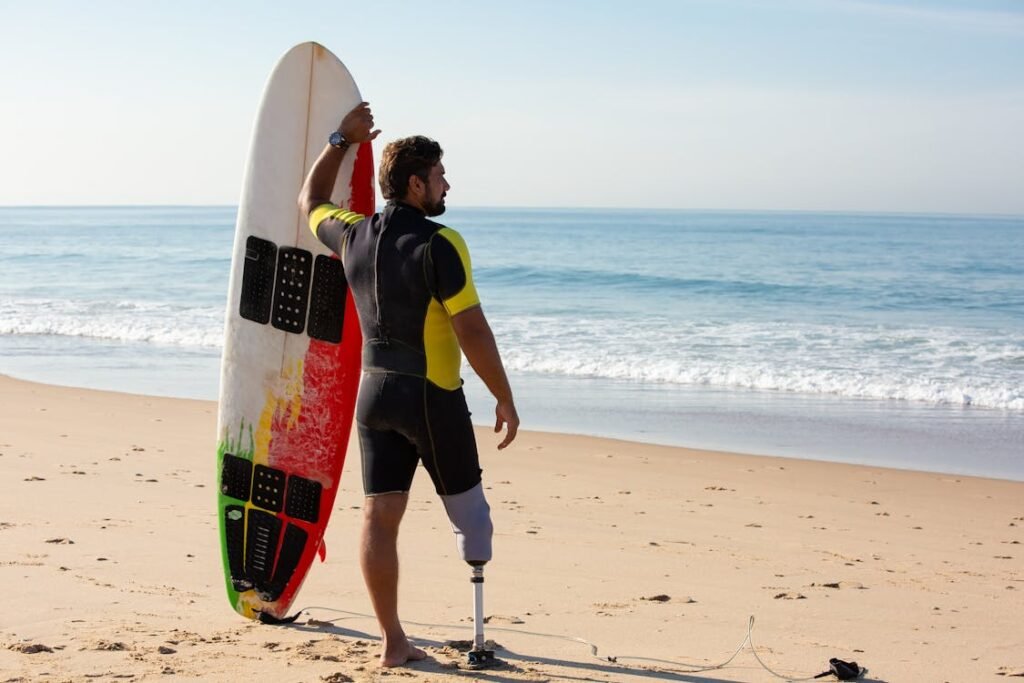
Finding Meaning and Purpose After Amputation
Healing after an amputation is not just about physical recovery—it is also about rediscovering purpose and meaning in life. Losing a limb can change the way you see yourself and your future, but it does not mean that life has to stop.
In fact, many people find that this journey leads them to new opportunities, deeper connections, and a renewed sense of purpose.
Redefining Who You Are
One of the biggest emotional challenges after an amputation is feeling like you have lost a part of your identity. You may struggle with the idea of not being able to do things the way you used to, or worry that people will see you differently.
These thoughts are understandable, but it is important to remember that your identity is not defined by a missing limb—it is shaped by your passions, character, and the impact you make on the world.
Rather than focusing on what has changed, try shifting your perspective toward what is still possible. You are still capable of learning, growing, and achieving your goals.
Many people who experience limb loss go on to do incredible things—whether it is returning to their careers, taking up sports, pursuing creative hobbies, or even becoming mentors for others facing similar challenges.
Setting New Goals and Dreams
After an amputation, it can feel like everything has been put on pause. However, setting new goals can help you regain direction and motivation.
These goals do not have to be big or overwhelming. They can be as simple as learning to walk with a prosthetic, mastering daily activities with one hand, or even exploring new hobbies.
Over time, as you become more comfortable in your new reality, your goals can expand. Many people find joy in pushing their limits—taking up adaptive sports, traveling, or even starting advocacy work to help others with disabilities.
Whatever your interests, setting achievable milestones can bring back a sense of accomplishment and excitement about the future.
Building a Supportive Community
No one should go through this journey alone. Connecting with others who understand your experience can be incredibly empowering.
Support groups, both in-person and online, provide a space to share struggles, celebrate victories, and gain insight from those who have walked the same path.
Some people find purpose in helping others. Sharing your story, offering encouragement, or mentoring someone who is newly amputated can be a deeply fulfilling experience.
It reminds you that even though you have faced challenges, you also have the strength to inspire and uplift others.
Family and friends also play an important role in your emotional well-being. While they may not fully understand what you are going through, allowing them to be part of your journey can strengthen your relationships.
Open communication about your needs, struggles, and victories helps create a supportive and understanding environment.
Discovering New Passions
Sometimes, an amputation opens the door to new experiences that you may never have considered before. Many people discover new interests and talents that bring them joy and fulfillment.
Adaptive sports, music, painting, writing, or even public speaking can be rewarding ways to express yourself and build confidence.
Exploring new activities is also a reminder that life is still full of possibilities. You may not be able to do everything exactly as you did before, but that does not mean you cannot enjoy life in a meaningful way.
Finding activities that bring you happiness will not only improve your emotional well-being but also give you a sense of purpose beyond your physical recovery.
Looking Forward With Hope
Amputation is a life-changing experience, but it does not have to define your future in a negative way. Every challenge you overcome makes you stronger. With the right mindset, support system, and determination, you can build a fulfilling and independent life.
There will be ups and downs along the way, but remember that healing is a journey, not a race. Be patient with yourself, celebrate your progress, and never stop believing in your ability to adapt and thrive.
The road ahead may look different from what you imagined, but it is still filled with endless possibilities, opportunities, and moments of joy.
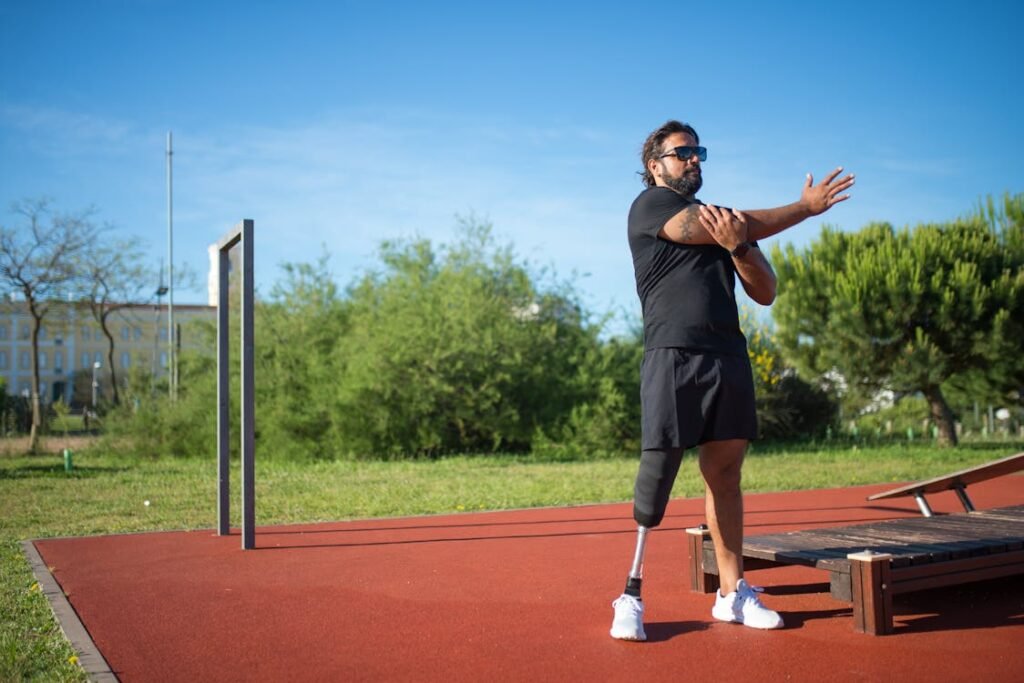
Conclusion
Coping emotionally after an amputation is not easy, but it is possible. The journey is filled with challenges, but also with growth, resilience, and new opportunities. In the beginning, it is normal to feel grief, frustration, or uncertainty. However, with time, support, and determination, you will regain confidence and independence.
Healing is not just about physical recovery—it is about embracing life in a new way. Rehabilitation, whether through therapy or gamified programs, can help you adapt, while setting new goals and discovering new passions can bring back a sense of purpose. Surrounding yourself with a supportive community will remind you that you are not alone, and each step forward, no matter how small, is a victory.
If you are looking for support, resources, or prosthetic solutions, reach out to Robobionics today. We are here to help you on your journey to independence and confidence.



